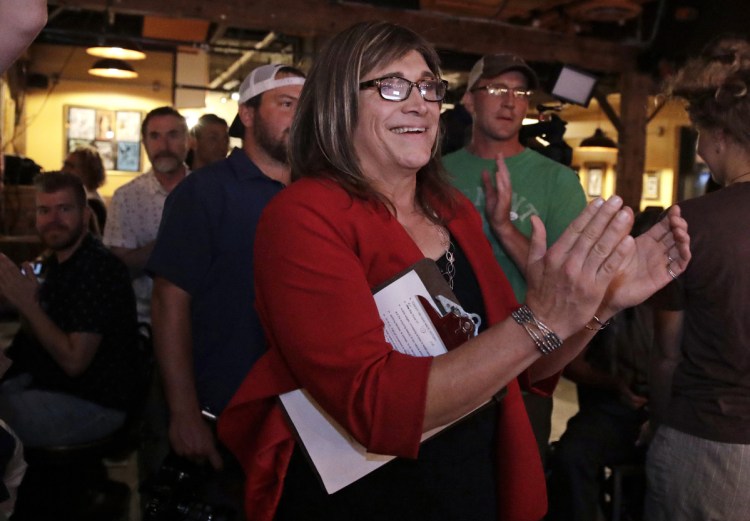ST. PAUL, Minn. — In a night of firsts, Democrats in Vermont’s primary chose the nation’s first transgender gubernatorial nominee. In Minnesota, they picked a woman who would be the first Somali-American member of Congress. Connecticut Democrats nominated a candidate to be the first black woman from the state to serve in Congress.
Democrats embraced diversity Tuesday, while Republicans in Minnesota rejected a familiar face of the Republican Party in favor of a rising newcomer aligned with President Trump.

Former Minnesota Gov. Tim Pawlenty failed to win the Republican nomination as he sought to regain his old job.
On the other side, Trump tightened his grip on the modern-day Republican Party as the turbulent 2018 primary season lurched toward its finale. A one-time Trump critic, former two-term Minnesota Gov. Tim Pawlenty lost a comeback attempt he was expected to win.
Trump fired off a celebratory tweet Wednesday, hailing “Great Republican election results” and adding “Red Wave!” He also endorsed a series of candidates in Wisconsin, including Bryan Steil, who won the Republican primary for the House seat held by Speaker Paul Ryan and Leah Vukmir, who will face Democratic Sen. Tammy Baldwin.
All but 10 states picked their candidates for November’s general election by the time the day’s final votes were counted. The stakes are clear: Democrats are working to topple Republican control of Congress and governors’ offices across the nation.
Four states held primaries Tuesday: Vermont, Connecticut, Minnesota and Wisconsin. Kansas’ gubernatorial primary, which was held last week, was finalized when Republican Gov. Jeff Colyer conceded defeat.
In Minnesota, Republican County Commissioner Jeff Johnson defeated Pawlenty, who once called Trump “unhinged and unfit” and was hoping to regain his old post. In Wisconsin, Gov. Scott Walker, endorsed just this week by Trump, won the right to seek a third term.
The president’s pick for Kansas governor, Secretary of State Kris Kobach, scored a delayed victory against Colyer, who became the first incumbent governor to fall this season.
In Vermont, Democrat Christine Hallquist won the nomination in her quest to become the nation’s first transgender governor. The former chief executive of Vermont Electric Cooperative bested a field of four Democrats that included a 14-year-old.
While she made history Tuesday, Hallquist faces a difficult path to winning the governor’s race. Republican incumbent Phil Scott remains more popular with Democrats than members of his own party in the blue state.
Vermont Democrats also nominated Sen. Bernie Sanders, who hasn’t ruled out a second presidential run in 2020, for a third term in the Senate. The 76-year-old democratic socialist won the Democratic nomination, but he is expected to turn it down and run as an independent.
Democrats appeared particularly motivated in Wisconsin, where eight candidates lined up for the chance to take on Walker.
Walker’s strong anti-union policies made him a villain to Democrats long before Trump’s rise. State schools chief Tony Evers, who has clashed with Walker at times, won the Democratic nomination and will take on Walker.
In Connecticut, Republican businessman Bob Stefanowski emerged from a field of five Republicans seeking to replace the unpopular outgoing governor, Democrat Dan Malloy. Former gubernatorial candidate Ned Lamont won the Democratic nomination.
Connecticut Democrats picked former teacher of the year, Jahana Hayes, to run for the seat being vacated by Rep. Elizabeth Etsy. Hayes could become the first black woman from the state to serve in Congress.
Send questions/comments to the editors.



Success. Please wait for the page to reload. If the page does not reload within 5 seconds, please refresh the page.
Enter your email and password to access comments.
Hi, to comment on stories you must . This profile is in addition to your subscription and website login.
Already have a commenting profile? .
Invalid username/password.
Please check your email to confirm and complete your registration.
Only subscribers are eligible to post comments. Please subscribe or login first for digital access. Here’s why.
Use the form below to reset your password. When you've submitted your account email, we will send an email with a reset code.